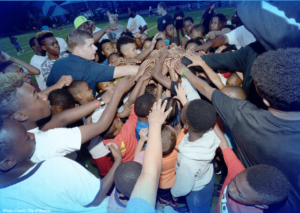STAT BOX
Philanthropy loves its buzzwords. High-impact. Data-driven. Donor-centric. I know I’ve heard plenty, and certainly repeated more than a few. So if you have your ear to the ground in trends in the giving and foundation space, you’ve likely come into contact with a newer one: resilience. Most visibly helmed by the Rockefeller Foundation (through its 100 Resilient Cities Initiative, of which Boston has been a participant for the last couple of years), the language of resilience and resiliency have inundated the philanthropic world. Where did it come from? And where is it going? Finally, if and how does it relate to our work with SheGives?
International Development
The term and concept of resilience first emerged in the global development sector. The UN defines resiliency as “the ability to withstand unexpected events and quickly recover,” often within the contexts of natural or economic disasters. More recently, global concerns have shifted to building resiliency to the increasingly accelerated effects of climate change, the impact of which is forcing many regions of world to create new contingencies.
Urban Resilience
In more recent years, cities and urban planning have on the concept of resilience from a reactive response to natural or economic disasters to include proactive and holistic community development. Washington Monthly writes: “Economic gains, social cohesion, safer communities – these are what we call the “resilience dividend” – the idea that an investment in resilience makes a city better in the short-term, as well as the long run.” Philanthropic entities have partnered with government agencies, community-based organizations, and in some cases, the private sector. Rebuild by Design, for example, was a partnership between the U.S. Department of Housing and Urban Development and The Rockefeller Foundation in the form of a competition awarded ten grants for city planning and storm resilience projects in New York City. The awardees included teams of architects, engineers, scientists, and civic organizations – a uniquely collaborative call to action that elicited new innovations.
We have this model in our own backyard, too: thanks to funding from the Rockefeller’s 100 Resilient Cities Initiative, Dr. Atyia Martin was named in 2015 to be Boston’s Chief Resiliency Officer. Dr. Martin’s work aligns well with the more holistic (or “healthy community”) approach to urban resiliency, which demands sound policies across sectors: affordable housing, public safety, education, social services, transportation, and more. She works with multiple community-based organizations to create aligned strategies to make the city stronger, healthier, and more collaborative. (Check out the “Blueprint for Boston’s Resiliency Strategy” if you want to learn more!)

Image via 100 Resilient Cities: A PREVIEW OF THE PRINCIPLES & FRAMEWORK
FOR BOSTON’S RESILIENCE STRATEGY
Now the holistic, cross-sector concept of “resilience” has made its way into the education world, as schools, parents, and services are recognizing the importance of cultivating social and emotional skills in students – and investing in programming outside the schoolday to provide students and families with resources.
Worth the Buzz?
Whether the conversation is about response to a storm or the importance of nurturing empathy in students, the concept of resilience isn’t going anywhere. And sure, you can call it a buzzword. But to me, a broad concept like “resilience” making its way through different sectors offers an exciting opportunity for both funders and the organizations they support: to think more intentionally together about how to support students, families, and communities – grounded in the wisdom and specific context of those communities. It marks an abandonment of the notion that a single service or intervention will meet all of an individual or community’s needs. In this framework, funders can be more effective and trusted conveners, as well as thought leaders and issue area experts. Maybe we, as members of the SheGives community, can have a conversation about what we believe will make the Boston area more resilient, and continue the conversation with other funders and organizations about how we can work towards those ends together.

